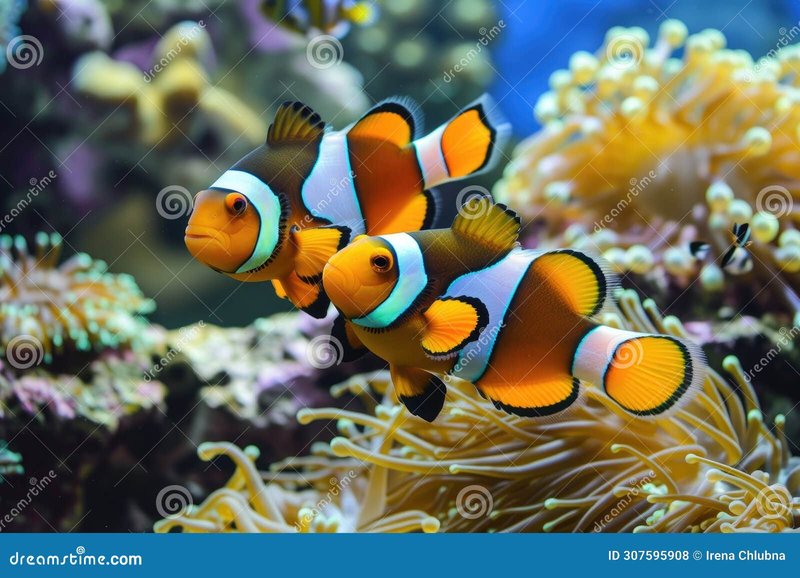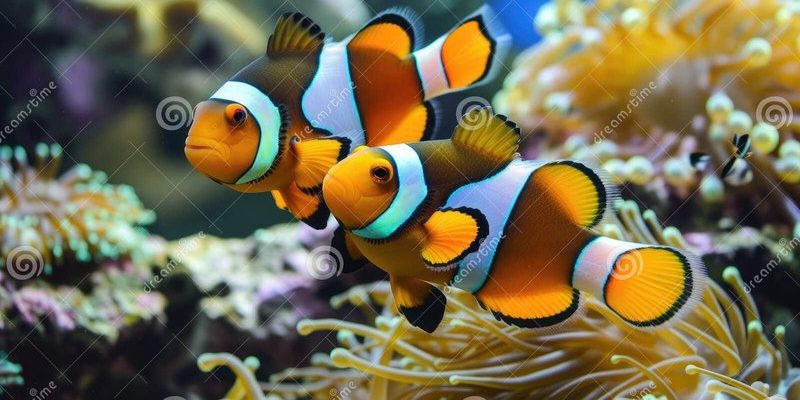
To put it simply, clownfish are generally safe for reef tanks, and when kept in the right conditions, they can coexist beautifully with various types of coral. However, there’s more to this story. Just like choosing a roommate, compatibility matters. In this article, let’s delve into the intricate dance between clownfish and coral, exploring what makes them a great match and any potential pitfalls you should be aware of.
Understanding Clownfish Behavior
You might think of clownfish as the happy-go-lucky fish of the reef. They have a unique relationship with sea anemones, which provide them shelter and protection from predators. In return, clownfish help keep the anemone clean and can even lure prey towards it. This symbiotic relationship is fascinating, but it also shapes their behavior and compatibility with other species.
Clownfish are known for their territorial nature. While they can be quite friendly, especially in small groups, they can also become aggressive if they feel their space is threatened. This means that when introducing them to your reef tank, you’ll want to pay attention to how they interact with the coral and any other tank mates.
If you’re planning to add clownfish to your reef tank, make sure to observe their behavior closely. Watch for any signs of aggression towards coral or other fish. Sometimes, they might try to “host” a branching coral, even if it’s not an anemone. While this behavior can be cute, it’s essential to ensure that the coral isn’t harmed in the process.
Choosing the Right Coral for Your Tank
Now, let’s talk about coral. Not all corals are created equal when it comes to housing clownfish. You’ll want to consider different types of coral to optimize their safety and compatibility. Generally, soft corals, like Xenia or Leather Corals, are more forgiving and can withstand clownfish antics better than hard corals.
If you’re looking to create a thriving reef environment, consider these coral types:
- Soft Corals: These are generally more resilient and can handle the movements of clownfish playing around them.
- Hard Corals: Some species, like Branching Corals, can be a good option, but they may require more careful monitoring.
- Coral Placement: Positioning your coral wisely is crucial. Avoid putting delicate corals too close to where clownfish might frequent.
Placement and choice matter significantly. For instance, if you place a soft coral where the clownfish like to hang out, chances are they’ll be fine. But if you have a hard coral in the mix, you might discover your clownfish nipping at it, which can lead to stress and damage.
Potential Threats to Coral
While clownfish can be pretty reef-safe, that doesn’t mean they’re entirely harmless to coral. There are a couple of behaviors that can cause problems. For instance, clownfish can be known to bite at the flesh of certain corals or pick at them while trying to establish their territory.
You might be wondering what the signs of stress look like in coral. Here are a few indicators:
- Coral Bleaching: If you notice color loss in your coral, it could be because they’re stressed. This might be caused by clownfish aggression.
- Physical Damage: Check for any visible signs of injury or decay on your coral, which might result from clownfish behavior.
- Behavioral Changes: If your clownfish seem more aggressive or territorial than usual, it could be affecting their interactions with coral.
By keeping a vigilant eye on your tank, you can identify and address any potential issues before they escalate. Don’t hesitate to rearrange coral or introduce tank mates if needed. Sometimes, a little change can go a long way in fostering harmony in your underwater kingdom.
Creating an Ideal Environment
To ensure that your clownfish and coral coexist peacefully, creating an ideal reef environment is key. Consider these tips to achieve a happy balance:
1. Water Quality: Regularly test water parameters like pH, salinity, and temperature. Keeping these stable can reduce stress for both clownfish and coral.
2. Lighting: Ensure your lighting setup suits both your clownfish and the coral you choose. Different corals have varying light needs, and it’s vital to tailor your setup accordingly.
3. Flow Rate: Clownfish prefer a bit of current, while corals have different flow needs. Look for a compromise that keeps both your fish and coral content.
By investing time and attention into these factors, you can cultivate an environment that not only supports your clownfish but also helps your coral thrive.
Common Myths About Clownfish and Coral Compatibility
You might have heard some myths floating around about clownfish and their relationship with coral. Let’s debunk a few of them to clear things up:
1. Myth: All clownfish will harm coral.
Reality: While some clownfish can be aggressive, many can peacefully coexist with the right coral types and tank mates.
2. Myth: Only anemones are suitable for clownfish.
Reality: While clownfish love anemones, they can adapt to living with other types of coral, provided the conditions are right.
3. Myth: Coral is too delicate for clownfish.
Reality: Many soft corals can handle the playful nature of clownfish without significant damage.
By understanding the facts and recognizing the nuances of this relationship, you can make better decisions for your aquarium setup.
Final Thoughts on Clownfish and Coral Compatibility
So, is the clownfish reef safe? Overall, yes, but with some important caveats. Clownfish can thrive alongside numerous types of coral, as long as you choose wisely and monitor their interactions. Remember that every tank is unique, and your success will depend on the specific species of both clownfish and coral you select, as well as how you maintain your environment.
Ultimately, creating a harmonious reef tank is not just about compatibility; it’s about fostering a balanced ecosystem where each creature can thrive. So take your time, do your research, and your clownfish and coral can become the perfect underwater roommates. Enjoy the show they put on—it’s a spectacle like no other!

